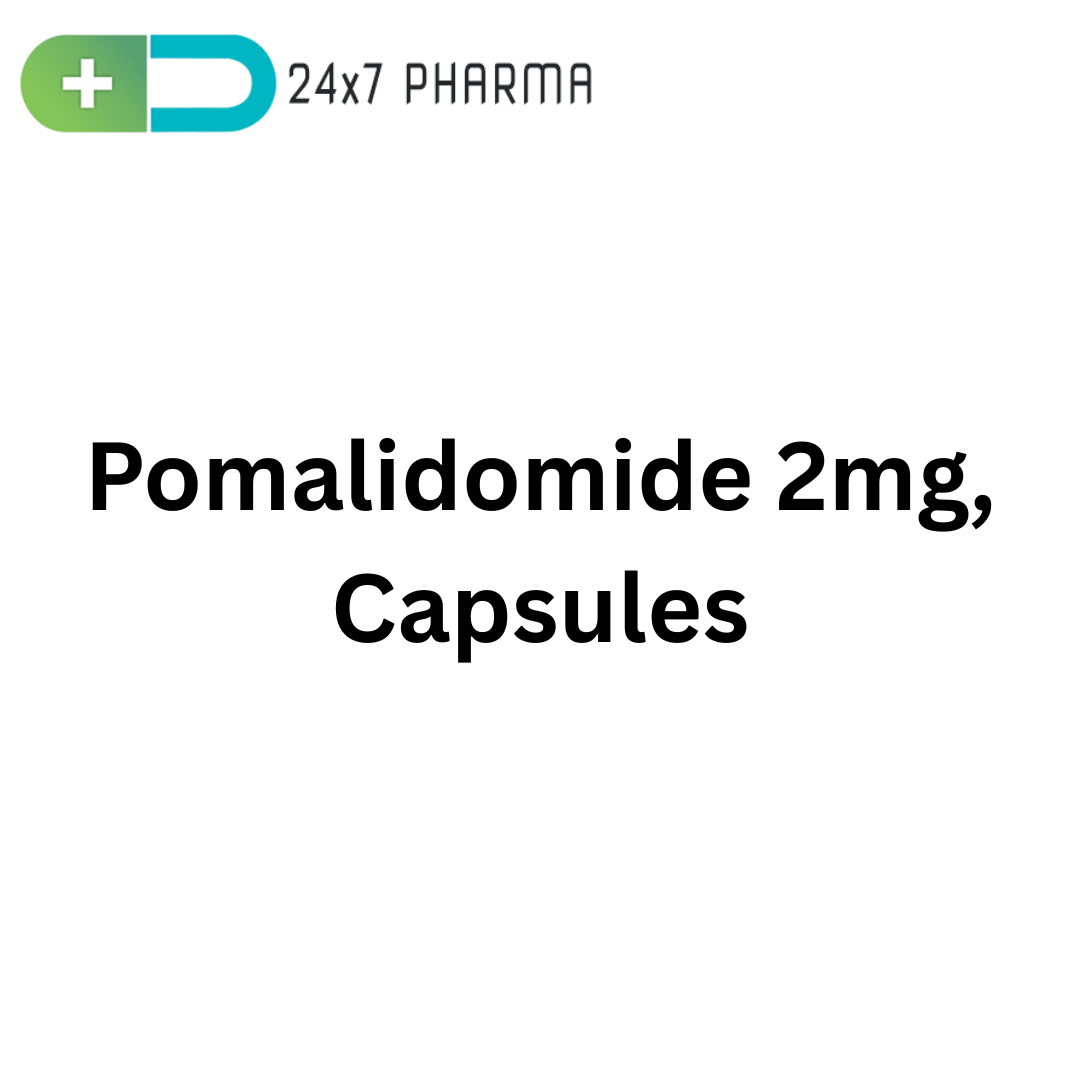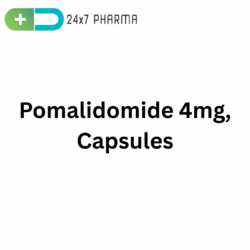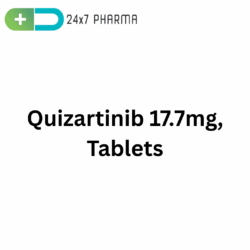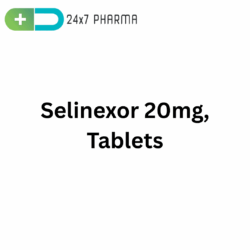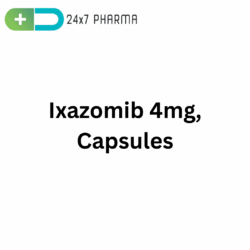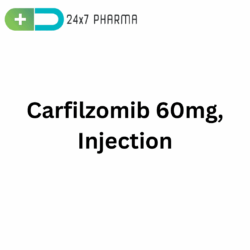LuciPoma 2mg, Pomalidomide Capsules
Pomalidomide, an oral immunomodulatory drug mainly used to treat multiple myeloma, particularly in individuals who have not responded to previous treatments, is available under the trade name LuciPoma 2mg. Manufactured for its potent anti-inflammatory and anti-cancer properties, LuciPoma is a powerful medication in the oncology space.
What is LuciPoma 2mg (Pomalidomide)?
A derivative of thalidomide, pomalidomide belongs to the class of immunomodulatory imide drugs (IMiDs). It exhibits multiple mechanisms that impact the immune system and cancerous cell growth. LuciPoma 2mg is mostly used in conjunction with other medications, such as dexamethasone, for relapsed or refractory multiple myeloma (RRMM).
It is considered a third-generation IMiD, more potent than its predecessors like thalidomide and lenalidomide, with better efficacy in resistant cases.
How LuciPoma Works / Mechanism of Action
Pomalidomide works through several mechanisms:
- Immune Modulation: Enhances T-cell and natural killer (NK) cell-mediated immune responses, helping the body target cancer cells more effectively.
- Anti-proliferative Effects: Inhibits the growth and multiplication of multiple myeloma cells directly.
- Anti-angiogenesis: Prevents the formation of new blood vessels that feed tumors, cutting off the supply of nutrients and oxygen necessary for cancer growth.
- Cereblon Pathway: Binds to cereblon, a protein that plays a role in ubiquitination and degradation of specific transcription factors (Ikaros and Aiolos), leading to apoptosis of myeloma cells.
How to Use / Indications
Indicated Uses:
Relapsed or Refractory Multiple Myeloma (RRMM): Applied to patients who have progressed in their disease after receiving at least two previous treatments, such as lenalidomide and a proteasome inhibitor.
- Off-label/Investigational Uses (under clinical research):
- Certain lymphomas
- Myelofibrosis
- Kaposi sarcoma
LuciPoma should only be used under the supervision of an oncologist or hematologist, with regular monitoring due to its side effects and toxicity profile.
How to Take / Dosage
Standard Adult Dosage:
- 2 mg once daily on Days 1 to 21 of each 28-day cycle.
- Must be taken in combination with low-dose dexamethasone.
- Continue until disease progression or unacceptable toxicity.
Administration Tips:
- Take orally with or without food.
- Swallow the capsule whole—do not break, chew, or open.
- Wash hands before and after handling.
- Missed dose: If missed within 12 hours, take it; otherwise, skip the dose and continue the regular schedule.
- Monitoring: Blood tests (CBC, liver function) are required routinely.
- Pregnancy tests are essential for women of childbearing potential.
Other Dosages
LuciPoma is primarily available in:
- 1 mg
- 2 mg
- 3 mg
- 4 mg
These are adjusted based on tolerability, side effects, organ function, and treatment response. Dosage may be lowered for patients with severe side effects or organ impairment.
Side Effects
Common Side Effects:
- Fatigue
- Nausea or vomiting
- Constipation
- Dizziness
- Back pain
- Cough
- Anemia
- Neutropenia (low neutrophils)
- Thrombocytopenia (low platelets)
Serious Side Effects:
- Deep vein thrombosis (DVT) or pulmonary embolism
- Severe infections (pneumonia, sepsis)
- Hepatotoxicity
- Peripheral neuropathy
- Interstitial lung disease
- Secondary primary malignancies
- Birth defects if taken during pregnancy
Because of the higher chance of birth defects, people must join a REMS (chance Evaluation and Mitigation Strategy) program.
Storage
- Store at room temperature (15–30°C) in a dry place.
- Keep away from direct sunlight and moisture.
- Keep out of reach of children.
- Do not use capsules if the packaging is damaged or past the expiry date.
Benefits
- Effective in refractory cases: LuciPoma works even after multiple prior treatments fail.
- Oral administration: Easier for long-term therapy compared to injectable chemotherapy.
- Targeted action: Works on multiple pathways to enhance efficacy and control disease progression.
- Improves quality of life: When combined with dexamethasone, it improves symptom control and overall survival in myeloma patients.
Prescription
- Schedule: Prescription-only (Rx).
- Special Program: Dispensed under a restricted distribution program due to teratogenicity.
- Only authorized pharmacies can provide LuciPoma.
- Requires signed patient consent and compliance with contraceptive measures.
Interaction
Drug Interactions:
When taken at the same time, dexamethasone may make it more likely that you will bleed or get an infection.
- CYP1A2 inhibitors (e.g., fluvoxamine): May increase pomalidomide levels.
- Strong CYP1A2 inducers (e.g., smoking): May reduce effectiveness.
- Anticoagulants/antiplatelet drugs: May increase bleeding risk due to thrombocytopenia.
- Live vaccines: Should be avoided during treatment.
Food Interactions:
- Can be taken with or without food.
- No specific food-drug interactions reported.
Lifestyle Interactions:
- Avoid pregnancy: Both males and females of reproductive potential must use effective contraception.
- Avoid activities requiring alertness if dizziness occurs.
FAQs
Can LuciPoma cure multiple myeloma?
No, it is not a cure but helps control the disease and improve survival.
Is LuciPoma chemotherapy?
Not in the traditional sense. It’s an immunomodulatory drug but plays a central role in cancer treatment.
Can older adults take LuciPoma?
Yes, with close monitoring. Dose adjustment may be required based on organ function.
Conclusion
LuciPoma 2mg (Pomalidomide) stands as a vital treatment option for patients battling relapsed or refractory multiple myeloma. With its multifaceted action—including immune modulation, anti-angiogenesis, and direct tumor suppression—it offers renewed hope for patients resistant to other therapies. However, the drug must be used with caution due to its side effect profile, especially the risk of birth defects and infections. Strict adherence to dosage, monitoring, and preventive measures can optimize treatment outcomes and improve quality of life for affected patients.

